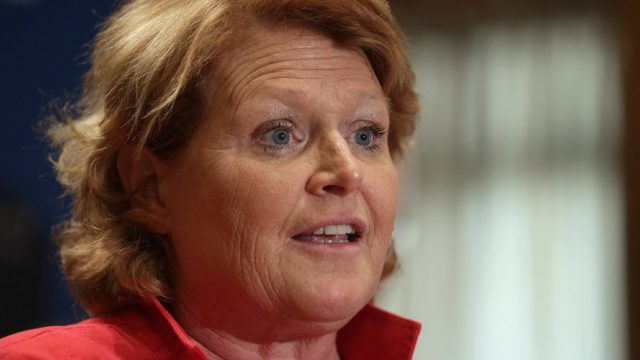North Dakota Democrats Shifting To The Right On Trade?

Last night the U.S. Senate passed a trade bill that gives the executive branch a “fast track” process to bringing trade agreements before Congress. This is a generally positive development. The easier trade is, the better off we all are.
But among the surprising votes for the agreement was Senator Heidi Heitkamp. You can see the roll call vote here; North Dakota’s Senator John Hoeven also voted for it.
It not be immediately clear why this was a surprising vote for Heitkamp. The bill was backed from the White House by her fellow Democrat Barack Obama, and Heitkamp has generally been pretty good on trade issues also supporting the end of the federal ban on exporting crude oil.
But historically, fast track trade policy was not something North Dakota Democrats supported. North Dakota Senators Kent Conrad and Byron Dorgan voted against it in 2002 under President George W. Bush and, proving that it wasn’t just the partisan affiliation of the president inspiring their opposition, they also voted against it in 1997 under President Bill Clinton.
Yet Heitkamp voted for the bill, and is already getting flak from the far left for it. The AFL-CIO called her vote to end the filibuster of the bill “shameful.”
SHAME! These are the 13 Democratic senators voted to shut off debate on #TPP & shut out workers –> #StopFastTrack pic.twitter.com/5atX9sHwEn
— AFL-CIO (@AFLCIO) May 22, 2015
So what are we to make of Heitkamp’s positioning on free trade?
I think it’s part and parcel with North Dakota’s overall shift to the right politically. Where once “Team North Dakota” – Senators Conrad and Dorgan along with Rep. Earl Pomeroy – dominated the state’s federal delegation for decades with a staunchly anti-free trade plank in their platform, Heitkamp must govern more conservatively.
After all, Heitkamp barely held on to a Senate seat in 2012 that Democrats have held since Quentin Burdick took it over in 1960 and that Conrad had last won in 2006 with about 70 percent of the vote. Heitkamp edged out a Republican takeover of the seat by running so far to the right that Republicans, jokingly, were offering her a party membership.
I think North Dakota voters have shifted to the right generally, and on free trade specifically, and Heitkamp is doing what’s necessary to survive.




